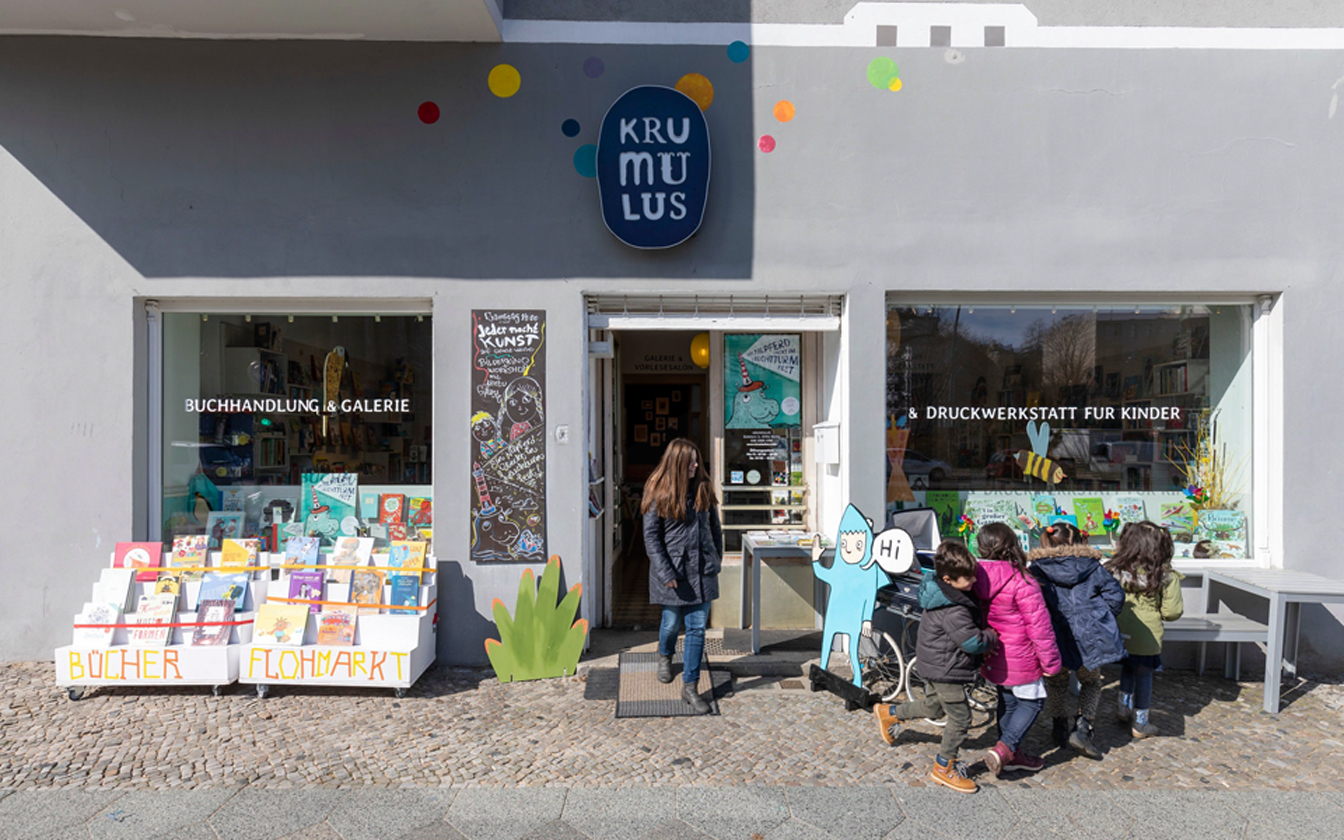On a recent Saturday afternoon, a hush fell in a “reading-aloud” room at Krumulus, a small children’s bookstore in Berlin, as Sven Wallrodt, one of the store’s employees, stood up to speak while holding a newly published illustrated children’s book about the life of Johannes Gutenberg, the inventor of the printing press. He looked at the crowd of anxious, mostly school-aged children and their parents, and said: “Welcome to this book presentation. If you fall asleep, snore quietly.”
Everyone laughed, but no one fell asleep. An hour later, the children followed Wallrodt down to the bookstore’s basement workshop, where he showed them how Gutenberg fit leaden block letters into a metal plate. Then the children printed their own bookmark using a technique similar to Gutenberg’s, everyone was thrilled.
Fares Aldaryousi, who is 6 years-old and knows how to read, said, “How do you print, I didn’t know that!” His best friend added that he had not known it was possible to make a stamp out of metal. Matthis Ritter, who is 9 years-old and owns a lot of books, learned that printing used to be called a “dark art” because the ink got on your fingers, while Mithuni Hopp, also 9 years-old, was most impressed with how monks used to make a certain kind of red ink: “They smushed snails!”
Among the topics touched on during the presentation were the concept of memento mori, how the United Nations defines what a book is, and the print number of Martin Luther’s bibles. This makes Krumulus, named for the pill Pippi Longstocking takes to never grow up, so special.
Speaking about Anna Morlinghaus, the bookstore’s founder, Christoph Rieger, head of the children and young adult program at the International Literature Festival in Berlin, said: “She has quickly established Krumulus as one of the most important and lively places for children’s and youth literature in Germany.”
“It’s a wonderful bookshop with an exceptional selection of books”, agreed Monika Bilstein, head of the Peter Hammer publishing house in Wuppertal, Germany.
In addition to selling books, the store, which opened in 2014 and won the prestigious German Booksellers Award last year, holds many events — some 280 last year alone — with themes that change every month or so, ranging from trees to jokes to poetry.
This spring, when the dominant theme was “how books are made,” eight university-level art students created their own children’s books from scratch. The walls of the “reading-aloud” room, which doubles as an exhibition space, were covered with the original artworks from these stories. One book, about two friends’ adventures in the depths of a giant nose, was a particularly big hit with the preschoolers who visited one morning as part of an ongoing, cost-free program for school groups.
Older children could acquaint themselves with the contents of the plastic envelopes holding each artist’s initial sketches, ideas and outlines, to get a sense of how the books were developed, then see the tools the artists used. Downstairs, storytelling workshops and book making courses gave kids a chance to try their own hand at the process.
During one of the Japanese bookbinding session, Rubi Lorenz, 8 years-old, already had cover art and a story line ready to go for “The City Bear.” “It’s about a country bear whose friends all move to Berlin,” she said. “He decides to go, too, but people are afraid of him. So he steals money to buy clothes to look like a human.”
This sort of hands-on training is very important, said Morlinghaus. “At Krumulus, children can touch almost everything.”
Morlinghaus, who studied graphic art in Poland, moved to Berlin over a decade ago and co-founded an art gallery specializing in contemporary East European photography. But she found the commercial gallery lifestyle incompatible with child rearing, and when her first son was born, she stopped working there. By the time she had her second son, she was thinking about opening a children’s bookstore.
“I knew it was going to be very difficult to open a bookstore, everyone tells you you’re crazy, there will be no future.” Still, she wanted to try. A month before her third son was born, she opened Krumulus in Berlin’s Kreuzberg district.
From the start, she wanted to focus on high quality children’s books, with great art. “In the beginning, people said ‘you have to have this and that book, because that’s what people want,’” she said. But she decided to buck children’s book trends, and it worked. (Morlinghaus is particularly proud of the store’s collection of antique fairy tale books.)
Other events that take place at the store include birthday parties, author readings, concerts, plays, puppet shows, comic workshops and regular meetings of a children’s book club called “The Reading Wolves.” “The events here are done with a lot of love,” said Julia Hoffmann, a former press director at the Berlin publishing house Kindermann Verlag.
Morlinghaus, who is pregnant with her fourth child (“I’m working on my reading group — I want test readers in each age category”), said she is very happy running her bookstore. “Some people wonder why I left contemporary art to focus on children,” she reflected. “But I really like it. When you are young, children’s books leave such a mark. That’s exactly what you always want to do with art — to really touch someone, to leave an impression. I see kids when they’re reading a book, and they are so into the story, I know they’ll remember it.”







